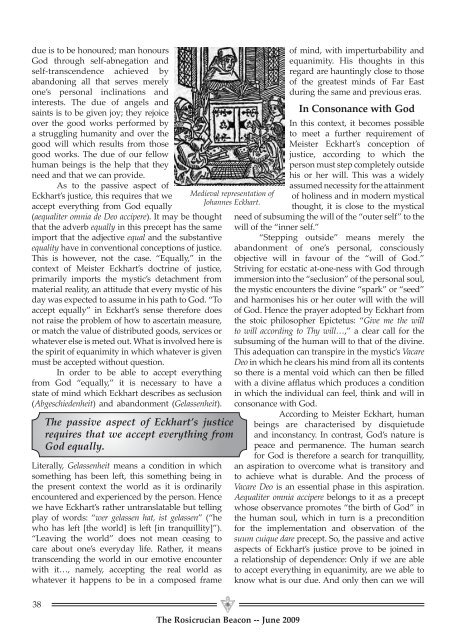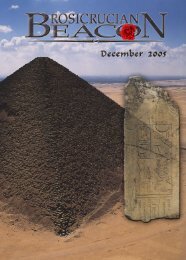due is to be honoured; man honoursGod through self-abnegation andself-transcendence achieved byabandoning all that serves merelyone’s personal inclinations andinterests. The due of angels andsaints is to be given joy; they rejoiceover the good works performed bya struggling humanity and over thegood will which results from thosegood works. The due of our fellowhuman beings is the help that theyneed and that we can provide.As to the passive aspect ofEckhart’s justice, this requires that weaccept everything from God equally(aequaliter omnia de Deo accipere). It may be thoughtthat the adverb equally in this precept has the sameimport that the adjective equal and the substantiveequality have in conventional conceptions of justice.This is however, not the case. “Equally,” in thecontext of Meister Eckhart’s doctrine of justice,primarily imports the mystic’s detachment frommaterial reality, an attitude that every mystic of hisday was expected to assume in his path to God. “Toaccept equally” in Eckhart’s sense therefore doesnot raise the problem of how to ascertain measure,or match the value of distributed goods, services orwhatever else is meted out. What is involved here isthe spirit of equanimity in which whatever is givenmust be accepted without question.In order to be able to accept everythingfrom God “equally,” it is necessary to have astate of mind which Eckhart describes as seclusion(Abgeschiedenheit) and abandonment (Gelassenheit).Literally, Gelassenheit means a condition in whichsomething has been left, this something being inthe present context the world as it is ordinarilyencountered and experienced by the person. Hencewe have Eckhart’s rather untranslatable but tellingplay of words: “wer gelassen hat, ist gelassen” (“hewho has left [the world] is left [in tranquillity]”).“Leaving the world” does not mean ceasing tocare about one’s everyday life. Rather, it meanstranscending the world in our emotive encounterwith it…, namely, accepting the real world aswhatever it happens to be in a composed frameMedieval representation ofJohannes Eckhart.The passive aspect of Eckhart’s justicerequires that we accept everything fromGod equally.of mind, with imperturbability andequanimity. His thoughts in thisregard are hauntingly close to thoseof the greatest minds of Far Eastduring the same and previous eras.In Consonance with GodIn this context, it becomes possibleto meet a further requirement ofMeister Eckhart’s conception ofjustice, according to which theperson must step completely outsidehis or her will. This was a widelyassumed necessity for the attainmentof holiness and in modern mysticalthought, it is close to the mysticalneed of subsuming the will of the “outer self” to thewill of the “inner self.”“Stepping outside” means merely theabandonment of one’s personal, consciouslyobjective will in favour of the “will of God.”Striving for ecstatic at-one-ness with God throughimmersion into the “seclusion” of the personal soul,the mystic encounters the divine “spark” or “seed”and harmonises his or her outer will with the willof God. Hence the prayer adopted by Eckhart fromthe stoic philosopher Epictetus: “Give me the willto will according to Thy will…,” a clear call for thesubsuming of the human will to that of the divine.This adequation can transpire in the mystic’s VacareDeo in which he clears his mind from all its contentsso there is a mental void which can then be filledwith a divine afflatus which produces a conditionin which the individual can feel, think and will inconsonance with God.According to Meister Eckhart, humanbeings are characterised by disquietudeand inconstancy. In contrast, God’s nature ispeace and permanence. The human searchfor God is therefore a search for tranquillity,an aspiration to overcome what is transitory andto achieve what is durable. And the process ofVacare Deo is an essential phase in this aspiration.Aequaliter omnia accipere belongs to it as a preceptwhose observance promotes “the birth of God” inthe human soul, which in turn is a preconditionfor the implementation and observation of thesuum cuique dare precept. So, the passive and activeaspects of Eckhart’s justice prove to be joined ina relationship of dependence: Only if we are ableto accept everything in equanimity, are we able toknow what is our due. And only then can we will38The Rosicrucian Beacon -- June 2009
the giving of this due to all.At first glance, thereseems to be a fundamentalincompatibility between theactive and passive aspects ofMeister Eckhart’s doctrine ofjustice, an inconsistency whichrocks its very foundation; for theaequaliter omnia accipere preceptseems to import a fatalistic tenetof justice which may be renderedas “To everyone according to hisdestiny.” This tenet seems to makeit entirely pointless to do anythingabout giving a person his dueand therefore seems to renderthe precept suum cuique darevacuous. On further investigationhowever, the incompatibilitybetween the two precepts provesto be unfounded once it is notedthat aequaliter omnia accipere relates to the passivejustice-subject (the grantee) but not to the activejustice-subject (the grantor).EquanimityThe finding that there is actually no inconsistencybetween the two precepts is reinforced by thecircumstance that aequaliter in the relevant contextrefers to equanimity rather than to equality in thesense of conventional doctrines of justice. Eckhart’smysticism is anything but quietism; its essentialmessage is the individual’s active participation inthe dynamics of the world. The deepest and mostprofound calling of any person is therefore to beGod’s co-operator and companion. The unio mysticawith God is achieved by the mystic leaving the“worldliness” of the world behind. But it is notmeant to be a permanent state of mind, namely, amind locked in seclusion. But rather, it is meantto be a passing inner experience which elevatesthe individual into companionship with God forbecoming His true helpmate in the execution of Hisdesigns.Since the frame of mind which results fromfollowing the aequaliter omnia accipere precept is anecessary condition for the human ability to applythe precept suum cuique dare, serenity precedesjustice in Meister Eckhart’s doctrine; justice flowsfrom serenity. The acceptance of everything inequanimity, (a) relieves receivers of the over-avidityof having what they may claim to be their due,The human search for God is a search fortranquillity, an aspiration to overcomewhat is transitory and to achieve whatis durable.and (b) relieves the renderersfrom over-anxiety in meeting thecorresponding claims. In this waya more composed examination ofany justice system is possible, andconsequently, sounder judgmentsabout what is to be accordedor what is to be withheld arepossible.This is particularlyimportant in disputes about justicewhere some relevant factors arehighly controversial. It is alsoimportant because when attemptsto apply justice are made from thevantage of serenity, the passionswhich the actual or alleged failureto do justice produces, tend toshed their obnoxious effect so thatsubsequent efforts to remedy thesituation in a reasonable mannerand ultimately to achieve justice are more likely tobe successful.It is to be considered that man is liable to doinjustice as a result of his very ardour to do justicebecause of the unsurveyability of many justicesituations in which the ostensible doing of justice tosomeone is liable to deprive someone else (existinghere and now or far away, or not yet existing) ofwhat is his or her due. Equanimity or serenity in thecourse of applying justice is therefore conducive toa more penetrating and broader assessment of therelevant justice-situations. We rely heavily todayon the mystical concept of serenity, one which hasundoubtedly existed for thousands of years, both inthe West through the ancient Egyptian lineage, andin the East through the Vedic lineage.Eastern and Western ConceptionsIn the West, justice differs fundamentally fromthe East in that in the Western [primarily Greek]tradition serenity arises from rather than gives riseto justice. In the Eastern tradition, it is the opposite.In Greek mythology therefore, Hesychia, the deityof “stillness resting in itself,” was conceived to haveemerged through virgin birth from the essence ofDike, the deity (goddess) of justice. Justice beingconceived as an ascendant rather than a descendantof serenity, it is no wonder that the endeavour to dojustice in the West has so often been a motive forcebehind wars and other forms of violence. “Justice”has often been invoked to justify the horror we haveThe Rosicrucian Beacon -- June 200939
- Page 2 and 3: RosicrucianEuropean ConventionBarce
- Page 4 and 5: y Ralph M. Lewis, FRCWhat is Mystic
- Page 6 and 7: practices? No, not at all. Mysticis
- Page 8 and 9: y Brian Doyle, FRCystical LORE TEAC
- Page 10 and 11: Disharmony at the physical, mental
- Page 16 and 17: y Bill Anderson, FRCThe beautiful v
- Page 18 and 19: They are grouped into 11 series enc
- Page 20 and 21: One of the many reliefs at Borobudu
- Page 24 and 25: any misconceptions in mind about ou
- Page 26 and 27: From Aristotle’s viewpoint the Ab
- Page 28 and 29: y Mary Jones , SRCIn this fifth and
- Page 30 and 31: and Plato, as well as his EudemianE
- Page 32 and 33: “[Pythagoras] wasthe first person
- Page 34 and 35: process the memory has to be evoked
- Page 36 and 37: y Cynthia Kawiza, SRCROSPERITY, AS
- Page 38 and 39: y Fraser Lawson, FRCt LAY IN MY HAN
- Page 42 and 43: witnessed in the wars of the Wester
- Page 44 and 45: The northern part of Fairmount Park
- Page 46 and 47: Music in the WildernessKelpius’ D
- Page 48 and 49: such exquisite reflections and spar
- Page 50 and 51: e carried out on the emotional impa











